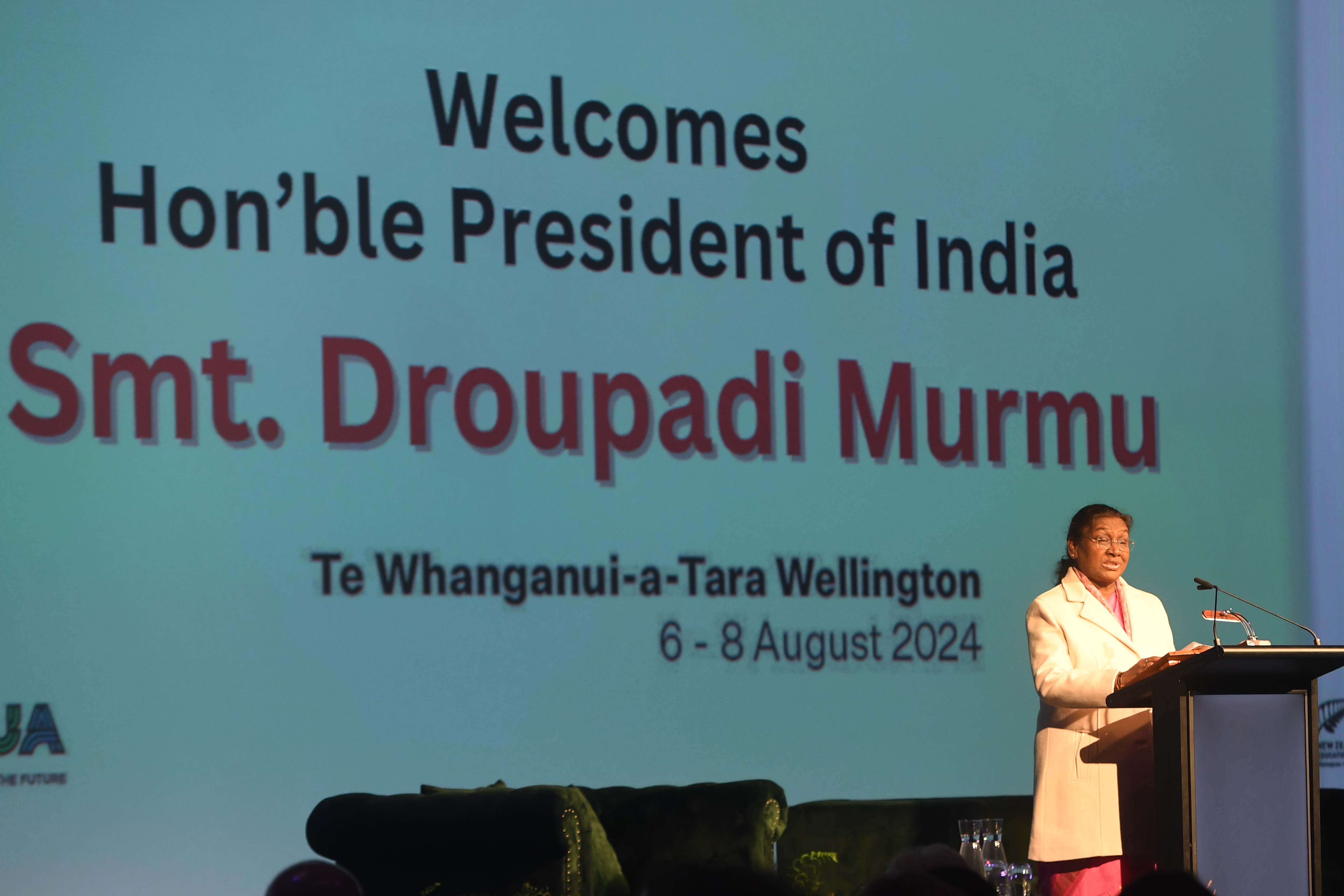ADDRESS BY THE HON’BLE PRESIDENT OF INDIA, SMT. DROUPADI MURMU AT THE NEW ZEALAND EDUCATION CONFERENCE
Wellington : 08.08.2024
 (93.14 KB)
(93.14 KB)
It is a pleasure to address the International Education Conference in New Zealand. It is indeed significant that India is the ‘Country of Honour’ for this year’s Conference.
Education has always been close to my heart. I have seen and experienced first-hand, the transformative power of education. I grew up in a remote village in India, where access to quality education was limited. My parents, despite their humble means, understood the value of education and ensured that I attended school. I was the first woman from my village to receive a college education.
It was through their unwavering support and the dedication of my teachers that I was able to pursue higher education and eventually serve my country in various capacities. This personal journey has instilled in me a deep belief in the power of education to uplift individuals and communities.
Friends,
Education, is not just an individual endeavor, but also a vehicle for social change and nation building. Education should be creative and touch all aspects of people’s life: be it economic, intellectual, artistic, economic, social or spiritual. Education enables society to create leaders, thinkers, guides, protectors and keepers of the conscience of society. Education is the cornerstone of a nation’s progress and advancement.
Knowledge has always been the highest purpose of life in India. From our timeless scriptures like the Vedas, Upanishads, and the Buddhist tripitakas, to the rich Sangam literature and the ancient centers of learning like Nalanda and Takshashila, knowledge has been an eternal pursuit in India. In 21st century India, our education system plays a significant role, and has produced leaders in diverse fields who are contributing not only in India but also around the world.
Today, India has made notable progress in the field of education. Our literacy rates have gone up significantly. More and more educational institutions have been set up across the country, and there is wider representation from across various sections of society in the education system. In higher education, India boasts some of the world's premier institutions such as the Indian Institutes of Technology (IITs) and Indian Institutes of Management (IIMs).
These institutions have been instrumental in producing world-class engineers, scientists and managers who contribute to the global knowledge economy. I am glad that a consortium of New Zealand Universities has established a Center at IIT Delhi for academic collaboration.
Government of India is bringing reforms to enhance quality and excellence in education. Our National Education Policy (NEP) 2020 is aimed at transforming Indian education landscape by promoting multidisciplinary learning, critical thinking and global competitiveness. It also opens up avenues for greater collaboration with foreign educational institutions.
New Zealand is renowned for its high-quality education with particular focus on research & innovation, inclusivity and excellence. Education remains one of the top service exports of New Zealand. The incorporation of Maori Culture and language into the curriculum has not only contributed to its preservation, but has also enriched your education environment. Given the priority attached to education by our two countries, it seems natural that we have developed such strong educational ties.
India and New Zealand enjoy a warm and friendly relationship, anchored by shared values rooted in democracy and rule of law. Our rich cultural exchanges and robust people-to-people ties have played an important role in fostering mutual understanding and goodwill between our nations. Educational exchanges are an important aspect of our bilateral ties.
The theme of today’s Conference, “Pathway to the World”, is both timely and relevant to our longstanding cooperation in education sector, where we can collaborate to create a pool of young and productive minds who can contribute in various capacities.
Ladies and gentlemen,
Today, India has a young aspirational demography, geared towards gaining quality education. Indian parents aspire for the best possible education for their children, and it is indeed welcome that many Indian students are gaining access to quality education at various institutions in New Zealand. 8,000 Indian students are pursuing various courses across New Zealand –making it the second largest group of international students here.
This number continues to grow. The acceptance of Indian students by New Zealand institutions not only underlines the value that Indian students place on receiving New Zealand education, but it also demonstrates the value that Indian students are adding to New Zealand in terms of this country's economic growth and multicultural fabric. Both countries therefore, need to work together to ensure that this success story continues. This would need regular exchanges between the institutions, experts and regulators of both countries.
The New Zealand Education Conference offers a great opportunity to continue strengthening the ongoing cooperation in education and also for exploring newer areas of cooperation. With rapid advancement of technologies, our educational institutions may collaborate in digital education and technology integration, such as Artificial Intelligence and Machine Learning, vocational and skills-based training, climate and environment studies, cultural exchange programs, research and innovation. I am confident that the discussions and exchanges of this Conference will pave the way for even stronger educational ties.
I will conclude here by conveying my heartfelt gratitude to Education New Zealand and to the Government of New Zealand for honouring India in such a special way. Let us continue to work together to build bridges of knowledge and understanding, and for creating world leaders through our educational collaboration.
Thank you!








